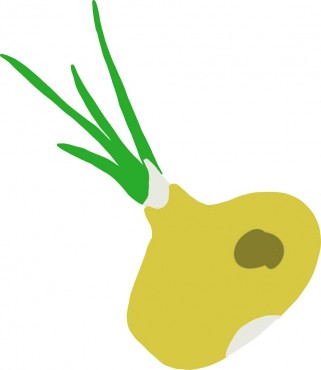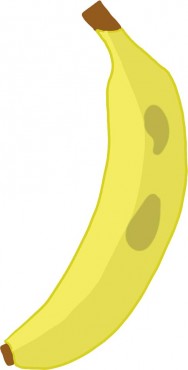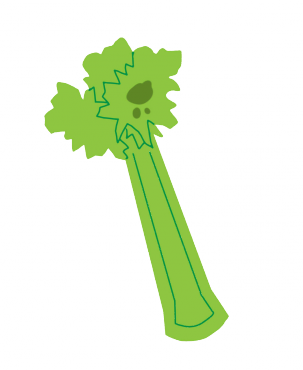I was thinking headlamps and twitchy nerves. There was a feeling of darkness and deceit. But when I first emailed Julie Anne, my soon-to-be-guide to the underworld of dumpster diving, we agreed that 2 p.m. was the best time to go.
The next day I went to meet Julie Anne Blackpen. Wandering around the coffee shop, I gave every girl I saw a “Hey, I’m Josh, let’s get some food from dumpsters” smile until I found her. Julie Anne showed up wearing pastel colors, tights, and low-heeled shoes. When I saw her outfit, it became very clear that dumpster diving wasn’t going to involve the stress and exhilaration I had anticipated. I felt foolish in my clunky hiking boots, painter’s pants, and ancient hoodie covered in stains.
Julie Anne probably stands closer to five-foot-four than five feet. But something about her impish smile, her swiftness to raise tones to a pleasant coo, and her partially shaved hair knotted petitely at the back of her head makes her seem much smaller. Maybe it’s the way her body swims in the light blue denim jacket she wears.
Although I have just met her, she seems like a distant cousin I only get to see once a summer. Julie Anne admits she just came from a friend’s funeral—which makes the rain seem more fitting and less of a burden. Getting in my car, we turn our first corner and come face to face with everyone’s favourite meteorological phenomena.
Julie Anne points past my windshield, “Wow, that’s a full fucking sky rainbow.” She pulls out her phone and apologizes for her need to tell someone about it. I tell her no worries, and point out how bizarre the weather is: rain at the coffee shop, blustery winds by the car, and then sunshine as we head towards our first dumpster.
Julie Anne made her first foray into the world of “dumpstering” while living on the University of Victoria campus, several years ago. Back then, she was a Biology major. When other people in residence went through the motions of moving back home, culling anything that didn’t seem important enough to keep, Julie Anne went through the dumpsters finding things that had no place in the garbage, like full palettes of pastels.
From there it was a natural transition into tray-raiding, something that any sane, low-income person has thought about, whether they are at a university cafeteria or a restaurant. Instead of paying that $6.75 for a weak beef patty and spiced fries, you simply opt for an abandoned plate and finish what someone left behind. As a child I never understood the idea that licking something meant it was off limits, so this idea of commandeering leftover food makes perfect sense. I admit to Julie Anne that, despite having thought about it a thousand times before, I’ve never snagged those faultlessly fine fries. There is, I say to her, a social stigma attached to it. I can’t see too many people even raising their voice against someone grabbing a tray of unwanted food, but the act in itself is enough to dissuade someone from doing it even when there is no deterrence.

As we pull into the parking lot of our first stop, I’m a little unsure of myself. The rain has picked up again and it seems strange that so many people are shopping mid-day on a Friday. I’ve brought some cloth bags just in case we need a way to carry our spoils. The art of dumpstering isn’t about being sneaky or fearless—it’s about knowing where to go. We park off to the side of the lot, for convenience, not for a speedy getaway. Walking towards the fenced enclosure, we come upon a stack of discarded crates and take two. My bags have just become obsolete. Patrons of this produce-only store don’t seem to notice us, though I’m watching all of them. The gate to our goal has been purposefully left wide open. An employee comes out to toss some cardboard. I mosey forward with relaxed shoulders, like we are there just for the crates. Julie Anne wanders towards the first dumpster. I follow, uncertain if I should say “hi” to the employee or just act natural.
As we reach the first dumpster, Julie Anne lifts the lid. Ever the gentleman, I utilize my six-foot-one frame and raise the covering for her to peer inside. She hops in and I’m stuck there like a buffoon, holding the lid open as if chivalry were even a part of this. Without saying a word she props up the prong on one side to keep the lid open. The world of dumpstering is rife with stigma and it’s trumped me so far. I am stuck wondering if jumping in will seem too eager, or if proximity to her will feel weird—in a dumpster, is there room for two?
Initially this first dumpster appears to be a dud—glossy black bags atop cardboard, and a smattering of recyclable coffee cups. But under those layers of cardboard lingers a cache of roughage—oranges, tomatoes, beets, onions, bananas, carrots, celery, peppers, and lemons. From arm’s length everything smells of lettuce and wet cardboard. I point out a shelled coconut with only the slightest bit of discolouring on one side. Julie Anne gives a squeak of happiness and hands it to me over the dumpster threshold. I put it in the crate.
But don’t think it’s always a beautiful abundance of immaculate food. Rather, it is a cornucopia of produce painted with bruises, or speckled with mold. Tomatoes with wizened skin, charred as if by a sorcerer’s curse. A basket of grapes tarnished with fuzzy white veins of Botrytis cinerea.
However, we dig a little deeper and find carrots so nice that if I were to wipe them on my painter’s pants and hand them off to an innocent bystander, they’d eat them without hesitation, and oranges that look, as Julie Anne would say, “perfectly fucking beautiful.”
Dumpstering is not so much about poverty as it is about politics. “Dumpster divers,” “skippers,” and “binners” are usually portrayed as soggy homeless men who are delighted to find a slice of pizza in the rattiest dumpster of the darkest alley. The media doesn’t portray people like Julie Anne as activists who reject a capitalist system through the act of foraging for food. However, it would be foolish to say that dumpstering doesn’t provide free food for people, which in turn obviously allows them to live on less income. Food sharing movements, like those in Germany, include websites devoted to sharing food recovered from supermarket dumpsters. The term “freegans,” those who detest paying for food they can find for free, was formulated to help explain this phenomenon. Over 8 000 people registered for www.foodsharing.de in less than two months of the site of being online.
Julie Anne, freegans, and dumpster divers across the country are foraging through an estimated $12 billion of viable food thrown out by Canadians (last year). A number which pales in comparison to the $180 billion of food binned by Americans. According to the National Institute of Health, that’s close to 40 per cent of all the food the U.S. produced in 2012.
These numbers speak to me and help explain my aversion to dumpstering—wasting food is a cultural habit. I wouldn’t raise a huff over unripe bananas but I sure as hell wouldn’t buy bruised ones. When shopping, I pass over an apple for not feeling firm enough. It’s people like me that force grocery chains to do a daily cleanse. To them, waste is simply a part of the business—in terms of unsold produce, American supermarkets lose $15 billion per year.
So in this world, where North American and European consumers annually waste 95–115 kilograms of food per capita, I can’t be blamed for assuming I’m better off tossing food that has reached its expiry. That is, until I see the simplicity of getting produce for free.
Having put a full crate of food in the trunk, Julie Anne and I head to our next destination. The rain has stopped, and the sun peeks through the clouds. This next place is so busy I have to drive to the far end of the lot just to find a spot. As we get out of the car, I feel as though I’ve made a friend in Julie Anne. Her ability to engage with others is uncanny. She could lead me into the most unholy of garbage piles and I’d follow sheepishly.
When we turn the corner at the back of the small organic market, we stumble upon an employee holding five metres of rain gutter in place. We offer our help, but he claims he doesn’t need it. “Some truck driver must have hit it on his way out.”
Julie Anne gives a disheartened noise, disappointed she can’t help out. Heading down the alley, she moves with a bounce to her step. “We’re here to raid your dumpster!”
A few employees come and go, all of them keen on assessing the damage of the gutter, none of them interested us. The first two dumpsters hold nothing but cardboard. The second has a couple inches of dumpster juice shimmering around a single garbage bag. What follows holds exactly what we came for: four plastic garbage cans of freshly tossed produce.
Here the produce is similar to geological strata. Pouring some lettuce off the top of one of the garbage cans reveals a layer of tomatoes. Digging past oranges exposes lemons. Going one layer deeper makes public another set of oranges so squishy my thumb pushes through the orb like gouging an eye. The smell of aerated citrus nips at my nostrils. A welcome scent, since up until this point everything has smelt like fruit wrapped in paper and drenched in rainwater.
Julie Anne begins to pick the prettiest of the tomatoes. I start by choosing the oranges that I figure would be good enough to eat here and now. I think to point out the abundance of fine-looking citrus fruit but quickly stop myself. That’s the whole point of this trip. To realize how awful the waste is, how simple this process is, and how foolish it is to look down upon the idea of getting food for free. Julie Anne already knows this a hundred times over. Though if I said it, I’m sure she’d look up at me all the same, smile curving from cheek to cheek, wonderfully happy to agree. But I’m not so sure I could live with myself after pointing out something so dense.
Out of nowhere, a man swathed all in black arrives. He looks ready to go on stage: black pants, black shirt, black jacket—different shades of charcoal, from his sunglasses all the way down to his shoes. He is Albrit, someone Julie Anne recognizes from binning but doesn’t “really know.” I offer up a joke about how I’ve just been fishing through garbage. We laugh as he chooses not to take it. He hops into the bin designated for garbage and comes out in a flash with two tubs of yogurt. Somehow he’s managed to resurface without so much as a splash of the brown-green dumpster soup on him. A pro if I ever saw one. He offers me a tub after explaining how “excited he is for dairy tonight.” He can’t stay though; he has some other projects to attend to. Just like that Albrit is gone. He came to shop, got what he wanted and skipped the checkout line.
With another full crate of produce, it’s time for Julie Anne and me to leave as well. We talk about going to another spot, but what’s the point? There’s more produce in my trunk than I’d ever buy in one grocery trip. I play coy, hoping that Julie Anne will ask me back to her place. As our time spent dumpstering has lasted less than 40 minutes, I need more writing material. Julie Anne lights up at the idea of us going to her place to go through the process of washing and preparing the food.

Everything gets a wash, but not as vigorous as I would have expected. No soap is used, we just rinse everything under warm water and use our hands to scrub each surface. Julie Anne has become proficient with the inlaid eight-inch serrated blade she uses. Much as a butcher would use a fillet knife to skim unwanted fat, Julie Anne works through the soft flesh of the tomatoes to scalp their discoloured spots. Onions, garlic, and potatoes are scored above their blemishes, and then those blemishes removed as Julie Anne draws blade to thumb. The bad is deposited into a bowl for composting. The good is tossed into a pot that crackles with hot olive oil and simmers with chunks of garlic that skim overtop evaporating liquids.
I pause to question a spongy, rosemary-green kiwi that we found. Surely you’d feel ill after eating something like that. I put it in the compost, and ask Julie Anne if she’s ever been sick from eating any of her dumpster-acquired roughage. She’s quick to say no.
After washing a bunch of onions, I come to the carrots we picked and feel a strange pleasure when I see them. I’m transported to the memory of washing vegetables plucked from my grandmother’s garden; the wet flecks of cardboard replace what would have been soil. Then it dawns on me that Julie Anne hasn’t done anything quickly since I met her. I ask, panicked, “Are you saying ‘no’ to protect this idea of normalizing dumpster diving?”
“No. I work quite hard to keep myself healthy.” Julie Anne goes on to admit having a weak immune system that she must wrestle with every now and again. We joke about being unable to dumpster-dive for expensive supplements. Satisfied with her answer, I return to the carrots and bask in the sound of Julie Anne snapping the fresh spines of celery before she adds them to the pot of homemade pasta sauce.
Despite our bounty, we left behind a slew of good root vegetables—it would have been rude to take more than what we needed. And yet we’ve still ended up with a plethora of fresh produce. To deal with the things that might not last in the fridge, Julie Anne prepares a bake. It is the keen eye of the diver, the willingness to rinse and cook the unsure, and the decision to toss the unsavoury, that keeps dumpster divers from becoming sick.
Yellow and red onion, sweet potato, golden and purple beet, zucchini, yam, eggplant, and carrot are cut up into bulk bits and put into a glass baking dish. The vegetables are sprinkled with coarse sea salt, sesame seeds, oregano, and rosemary, then topped with a cup and a half of water, and cooked at 350°F. Julie Anne stores the rest of the produce inside the fridge. Except for the coconut. She has yet to decide its fate.
Julie Anne runs her finger down the seam of a banana, rather than breaking its head, and hands me half of the dumpster fruit. It tastes just like a banana.
I think about how most people jeer at me for not washing my apples before I eat them. I can’t help but wonder how long it would have taken Julie Anne and me to go to a grocery store, pick these fruits and vegetables, wait at the till, pay for them, drive home, and then wash them. The same amount of time? Julie Anne had to deal with me asking questions, taking notes, and leaning on her for support every time I found a different piece of fruit. Still, from start to finish, we got a meal in the oven in just under two hours—for free.
Julie Anne admits that part of what draws her to dumpstering is that it’s a meal mixed with politics. Not to say that jumping in bins or digging through mushy greens is a way to shout her political opinions from the mountaintop, but it does let her share her beliefs through a meal. It allows her to create community and usher in a difference of opinion, make dinner for a household of people for free, and share grapes with someone who was a complete stranger only a few hours ago. A stranger who, before today, would have refused the idea of harvesting anything from a garbage bin.









